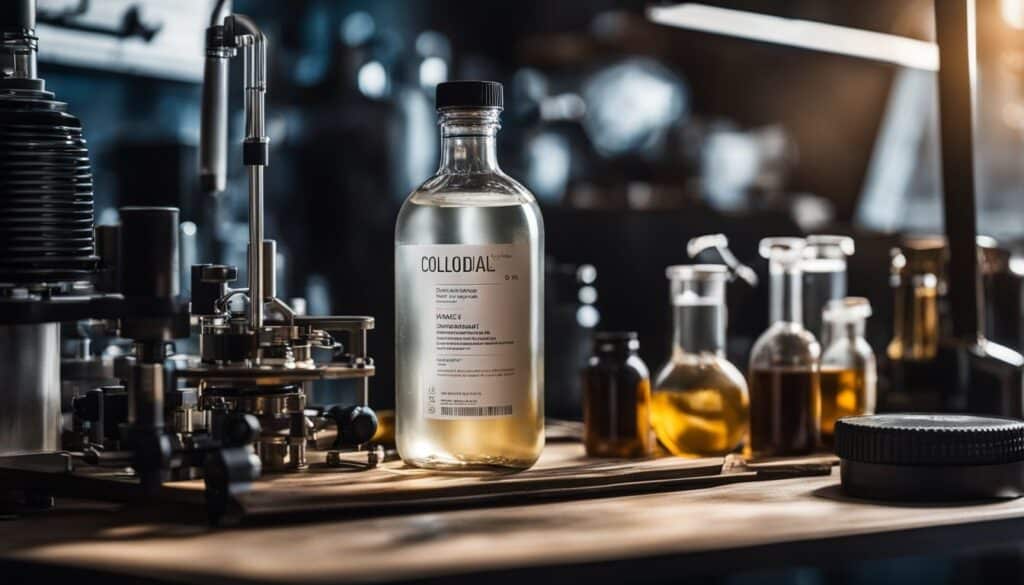Potential Side Effects Of Colloidal Silver: What You Need To Know

Many seek alternative health remedies, but not all treatments are safe. Once heralded for its medicinal properties, colloidal silver side effects can be severe.
This article delves into what colloidal silver is and the potential dangers it poses to your health. Keep reading to make an informed decision on its use.
Key Takeaways
- Colloidal silver can cause argyria, which turns skin blue-gray and is permanent.
- It might hurt your brain, like causing seizures, or harm your kidneys if you take too much.
- Be careful with colloidal silver because it doesn’t mix well with some medicines and supplements.
What is Colloidal Silver?

Colloidal silver is a suspension of tiny silver particles in a liquid. It is often touted as an alternative remedy and sold as a dietary supplement, but its safety and effectiveness have been the subject of much debate.
Definition
Colloidal silver is a liquid mix with tiny silver particles floating in it. People sell it, saying it can help with health problems, but there’s not much proof that it works. Silver has been used for a long time to stop germs and heal wounds, but we don’t know how well it works when you swallow it or put it on your skin.
Uses & Effectiveness
People use colloidal silver, hoping to improve their health. They think it can help with skin problems, hay fever, wounds, and infections. But the truth is different. No strong science backs up these ideas.
Many companies sell products containing colloidal silver ingredients for all sorts of sicknesses. Yet there’s no real proof they work for any of them.
The Food and Drug Administration (FDA) says colloidal silver isn’t safe or effective. This means it might not do what people hope it will do for their health. The FDA also warns against using colloidal silver drug products because they are unsafe or help your body fight diseases.
So even if you see many things on the market claiming they can fix your health issues, remember there’s no guarantee these items will work.
Potential Side Effects of Colloidal Silver

Potential side effects of colloidal silver include argyria (bluish-gray skin discoloration), brain function problems, ocular argyrosis (discoloration of eyes), seizures, and kidney damage.
It is important to be aware of these potential risks before considering colloidal silver.
Argryia (bluish-gray skin discoloration)
Argyria turns your skin a blue-gray color. It happens when you take in silver over a long time. Your gums might change color first. Then your skin can look gray or bluish. This is because silver builds up in your body and deposits in your skin.
If you use colloidal silver, this could happen to you. The condition is often permanent, and there aren’t many ways to fix it. People who want better health should know that argyria from too much silver intake is rare but serious.
Brain function problems
Colloidal silver can lead to brain function problems, such as seizures. It’s important to be aware of this potential side effect when considering its use for health improvement. Additionally, taking excessive colloidal silver may result in serious and long-lasting issues like kidney damage.
Remember, being cautious about the amount of colloidal silver consumed is essential to avoid these severe health concerns, especially related to brain function and overall well-being.
Ocular argyrosis (discoloration of eyes)
Ocular argyrosis, or the discoloration of the eyes due to silver exposure, can lead to a bluish-gray appearance around the eyes. This condition is linked to chronic ingestion or overexposure to silver compounds, such as those found in colloidal silver products.
The buildup of silver particles in the body at toxic levels can cause permanent bluish-gray discoloration of the eyes and mucous membranes, emphasizing the importance of understanding potential side effects associated with colloidal silver use and ensuring safe intake.
Chronic exposure to silver has been reported to result in ocular argyrosis, underlining the need for caution when using colloidal silver products. It’s crucial to recognize that ingesting or being overexposed to silver compounds can have serious consequences on eye health, making it essential for individuals considering colloidal silver supplementation to be aware of these potential risks and exercise appropriate precautions.
Seizures
Seizures can occur as a potential side effect of consuming colloidal silver. In rare cases, excessive intake can lead to long-lasting severe health problems, including seizures and kidney damage.
It’s important to be aware that colloidal silver has been associated with brain function issues, which include the risk of experiencing seizures.
Consuming colloidal silver should be approached with caution due to its potential to cause serious side effects such as seizures. Understanding these risks is crucial in making informed decisions about using products containing colloidal silver.
Kidney damage
Consuming colloidal silver can lead to serious health risks, including kidney damage. The potential harm comes from the accumulation of silver in the kidneys over time, which can cause injury to the blood-filtering mechanisms.
This build-up of silver in the kidneys has been linked to long-term issues like kidney damage and should be a significant concern for those considering using colloidal silver as a health remedy.
Using evidence-based research, individuals need to understand that there is no clinical support for consuming colloidal silver, as its ingestion raises several serious health risks, such as permanent kidney damage.
Precautions and Warnings
Following recommended dosage guidelines when using colloidal silver is important, as excessive intake can lead to potential side effects. Additionally, be cautious of interactions with medications and supplements when using colloidal silver to avoid any adverse reactions.
Recommended dosage
When taking colloidal silver, it’s crucial to follow recommended dosage guidelines. The appropriate dose may vary based on the specific product and intended use. It’s important to consult with a healthcare professional or follow the instructions provided by the manufacturer for safe and effective usage.
Adhering to proper dosage recommendations can help minimize potential side effects and promote the responsible use of colloidal silver supplements.
It is important to note that colloidal silver is not approved for all uses, so it’s essential to exercise caution and avoid excessive intake. Understanding the recommended dosage for your specific needs can aid in maximizing potential benefits while minimizing any associated risks or adverse effects related to its usage.
Interactions with medications and supplements
Colloidal silver products can interact with various medications and supplements, potentially causing harmful effects on health. Here are some important interactions to be aware of:
- Antibiotics: Colloidal silver may interact with certain antibiotics, reducing their effectiveness and potentially leading to treatment failure for bacterial infections.
- Levothyroxine: Individuals taking levothyroxine for thyroid conditions should be cautious as colloidal silver can interfere with the absorption of this medication, affecting its ability to regulate thyroid function properly.
- Immunosuppressants: People on immunosuppressant drugs must avoid colloidal silver as it may counteract the intended suppression of the immune system, leading to complications in managing autoimmune conditions or organ transplants.
- Antacids: Using antacids alongside colloidal silver could reduce the body’s ability to absorb this product, affecting its overall efficacy and potentially causing gastrointestinal discomfort.
- Mineral Supplements: Combining colloidal silver with mineral supplements could lead to an imbalance in mineral levels within the body, impacting overall health and well-being.
- Cardiovascular Medications: It’s important to consult a healthcare professional before using colloidal silver if taking medications for heart conditions or blood pressure regulation, as interactions could impact cardiovascular health.
- Chemotherapy Drugs: Colloidal silver may interfere with chemotherapy drugs, reducing their effectiveness in combating cancer cells and compromising the outcome of cancer treatment.
- Herbal Supplements: Interactions between herbal supplements and colloidal silver may result in adverse effects and disrupt the therapeutic benefits intended by these natural remedies.
Finally…
In conclusion, understanding the potential side effects of colloidal silver is crucial for making informed health decisions. It’s essential to be cautious about using colloidal silver, especially considering the lack of clinical evidence supporting its medical effectiveness.
Consulting with a healthcare professional before colloidal silver ensures safety and minimizes potential risks. Awareness of possible side effects, such as skin discoloration, neurological problems, and kidney damage, empowers individuals to prioritize their well-being wisely.
Ultimately, staying informed about the risks associated with colloidal silver can help protect one’s health and make confident choices toward overall wellness.
FAQs
Q: Is colloidal silver safe to use?
A: The safety of colloidal silver is a matter of debate. While some people believe it is safe, the FDA and other health organizations have issued warnings and cautions about its use due to potential side effects.
Q: Can I take colloidal silver to treat medical conditions?
A: There is not enough scientific evidence to support the use of colloidal silver for treating any medical condition. It is important to consult a healthcare professional before using it for treatment.
Q: How does colloidal silver work?
A: Colloidal silver products are often marketed with claims of boosting the immune system or treating infections. However, the mechanism of action and efficacy of colloidal silver is not well-established through scientific research.
Q: Are there potential side effects of using colloidal silver products?
A: Colloidal silver has been associated with a condition called argyria, which causes the skin to turn blue-gray. It can also result in other toxicity issues related to excessive intake of silver nanoparticles or silver ions.
Q: Is oral colloidal silver consumption safe?
A: The oral use of colloidal silver is not considered safe due to the potential for unsafe levels of silver accumulation in the body and the risk of developing argyria.
Q: What are the recommended doses of colloidal silver?
A: There are no established safe doses of colloidal silver. Due to the lack of regulation and potential health risks, it is not recommended to use colloidal silver as a dietary supplement or for any medical purpose.
Q: Is it worth trying colloidal silver for its purported benefits?
A: Due to the lack of scientific evidence supporting its efficacy and the potential for serious side effects, it is not advisable to try colloidal silver as an alternative remedy or supplement.
Q: Are there any over-the-counter drug products containing colloidal silver?
A: There are colloidal silver products marketed as over-the-counter supplements or remedies. However, the FDA has raised concerns about the safety and efficacy of these products.
Q: What are the potential risks associated with the use of colloidal silver?
A: The risks include the development of argyria, toxicity from silver ingestion, and the lack of regulation in the market for colloidal silver products, making it difficult to assess the safety of using them.
Q: What is argyria, and how is it related to the use of colloidal silver?
A: Argyria is a condition where the skin turns blue-gray due to prolonged exposure to silver or silver compounds, which can result from colloidal silver ingestion. It is a known side effect and risk associated with using colloidal silver.

